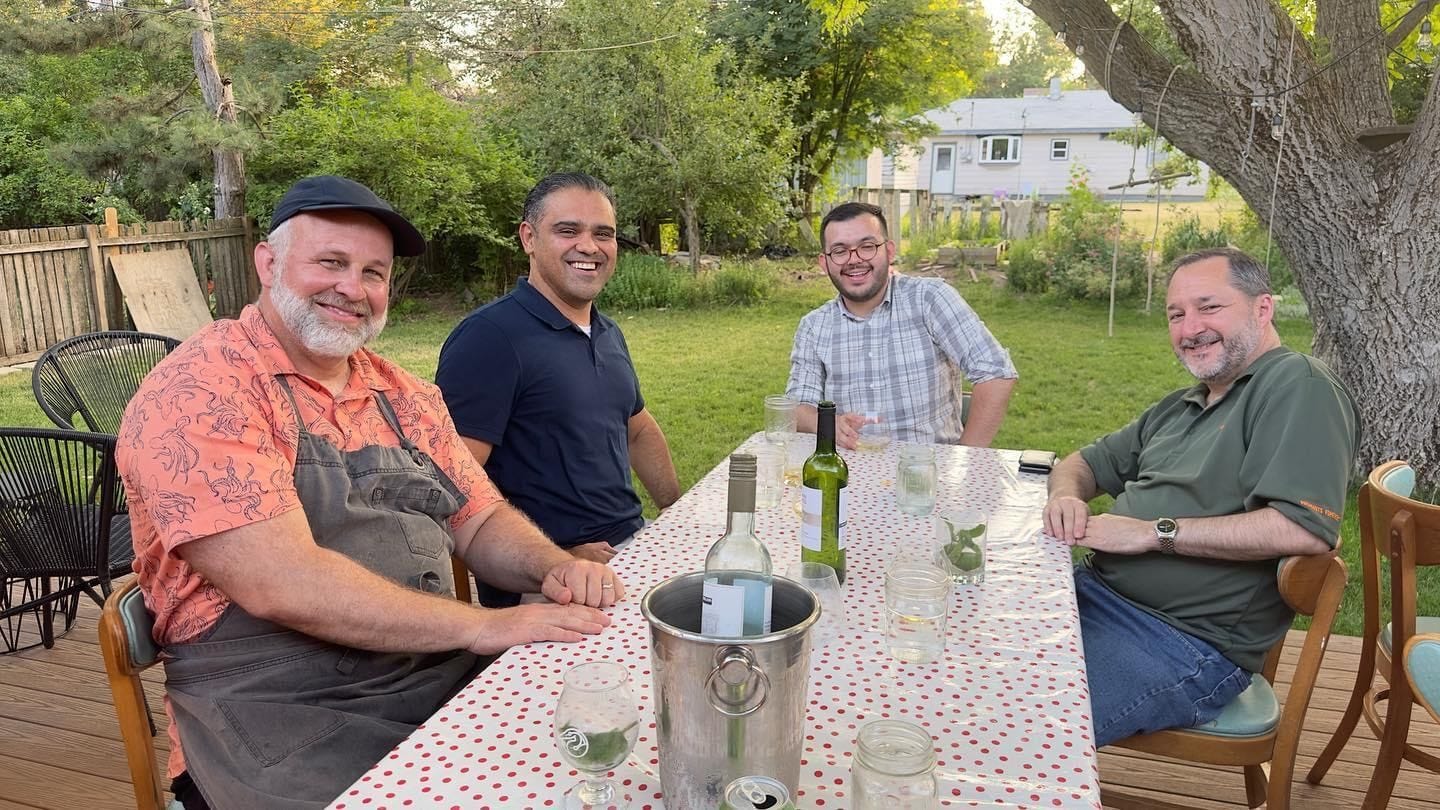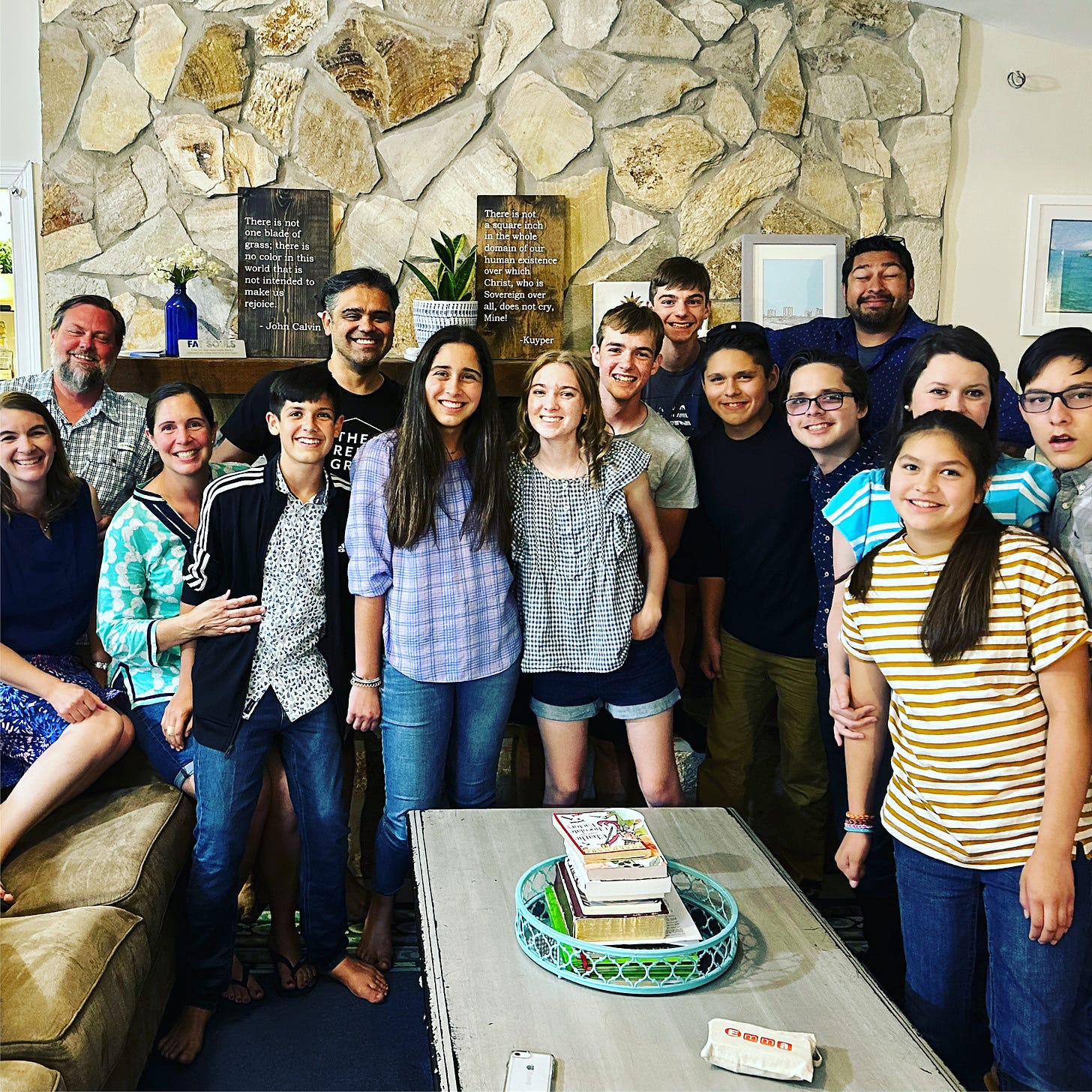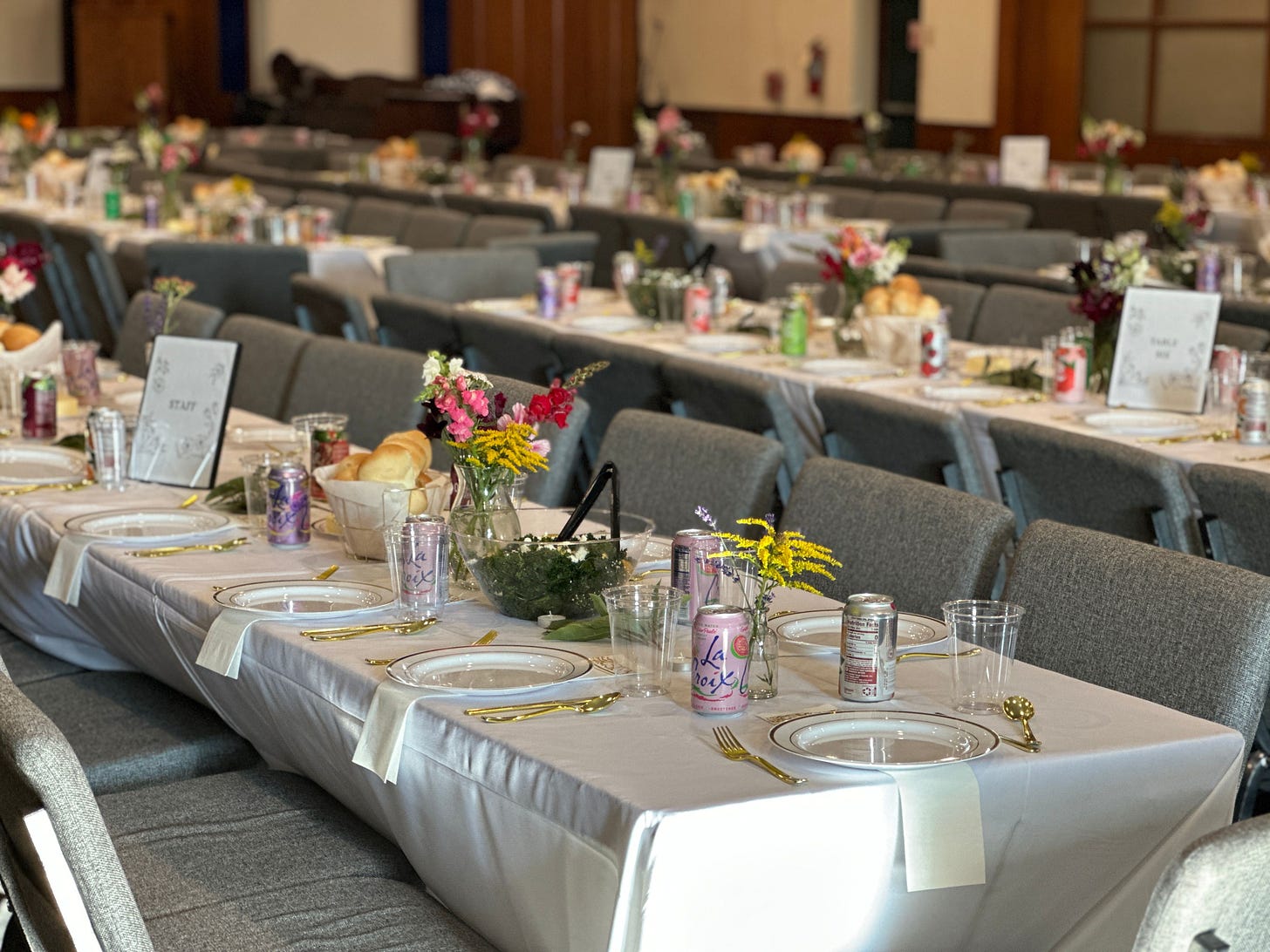A Theology of Feasting and Practical Ways to Keep the Feast
One of the blessings of any community is the shared stories of togetherness and sweet memories formed at dinner tables and campfires.
When we take it seriously, many will view it strangely. It’s the reason spectators were always puzzled why Christian martyrs died singing; it’s the reason so many kings and rulers expected the Church to give up following Jesus after he died, and it’s the reason persecution throughout history caused the Church to grow even more.
Every time unbelievers expected the Church to perish, she persevered. When the world expected her to bow before her imperatives, she overcame the odds and did the opposite.
As we look around today, more than ever, we need to live out our faith with utmost seriousness. But how does this seriousness fleshes itself out? When you ask an unbeliever to characterize a Christian, it’s not uncommon for some to say that Christians are sad. This was Nietszche’s critique of Christianity—that we are dull! That’s an unfortunate assessment because the Christian who walks around in constant sadness does not represent the Gospel well. He perpetuates the claim of the unbeliever that we are a joyless people.
What Joy Is Not
I assert that to be serious about the Christian faith is to be in a state of characteristic joy. Now, a caveat: notice that I did not say, “We always have to smile,” “Always act as if everything’s all right,” or “Fake our way through life.” There are times when pain causes us to slow down, when the smiles do not come, or when we need counseling to deal with our grief, a community to relieve our sorrow, or a tender embrace to know someone cares for us. I used the phrase “characteristic joy” because I believe the Christian life is to be identified by joy. If we were to take the average temperature of our lives, it should reflect a reflective joy even despite the many setbacks to our joy.
To be Christian is to dwell in joy. Christian joy is the barometer of your spiritual life [1]. The Bible is full of exhortations to joy. Jesus comes so that “our joy may be full” (John 15). That’s the Christian message. We should out-joy the world.
Community and Festivity
The overflow of that joy forms our communities. But the lack of that joy also forms a community. Congregations that constantly bicker over minutia, leadership that is always at odds with one another, and people who don’t treasure hospitality are often signs of communities where joy is no more or in the process of exiting the building. For a community to out-joy the world, she must form a history of shared stories of togetherness and sweet memories formed at dinner tables and campfires.
How Should the Church Then Live?
A body must practice habits and rituals to perpetuate joy. The Scriptural witness demonstrates that the principle “A Church that eats together stays together” must be applied in its sacramental context and her life of feasting. When we do not eat together, we lose our corporate sense of the role of food in the Christian life. We lose our rhythms, and ultimately, we lose our joy.
God created us to practice good things frequently, lest we forget their purpose. And this is where I wish to tie the concept of joy to festivity. Festivity is not a word we use often, but I want to see it re-captured in our Christian culture.
When discussing festivity, we consider days when the “world of work” is interrupted.[2] It’s an occasion where joy is sovereign, and the labors of our hands rest to enjoy the rest our hands produced. But for true festivity to occur, we need someone to set the time for us because we are so prone to not feast. We forget the feast because we delight in the mundane. As C.S. Lewis says, “We are too easily pleased.”[3] Instead of choosing the rewards promised by Jesus, we satisfy ourselves with appetizers.
God knew that we would struggle to keep the feast after the Fall. When there was no sin in the Garden, man lived in peace with God; every day was a feast day. But after the Fall, we forgot what it was to feast. And so, God continually reminds us what we are to be a people observing feasts unto our God.
How to Party Like a Hebraic Church
God knows that we forget so often, so he appoints us festivals. In Leviticus, Moses announced to the Church the days of feasting. Even the Old Testament church had announcement time. Worship and feasts were natural parts of their calendar. Leviticus 23:9: “For seven days present a food offering to the Lord. And on the seventh day, hold a sacred assembly and do no regular work.” These feasts appointed by God were “demonstrations of His generous hospitality.”[4] Every time the people met, they joined with adoration with feasting. Sometimes, it would go on for days and days.
Do you think we have that energy today? Could we go one for seven days of feasting? We would not know how to manage or administer that joy. If we were forced to feast for that long, we would have to fabricate smiles, wearing fake smiley faces to give a good impression. We would take selfies for about an hour and then be bored. Our bodies would start ticking because we have not checked our email, stock market, or social media updates.
When I was a kid, there was a man in our neighborhood who smoked cigarettes from the time he woke up to the time he went to bed. He was diagnosed with cancer, and his adult children took his cigarettes away. So, he walked around the neighborhood searching for any leftover cigarettes he could light up and smoke. His entire reason to live was gone.
I often think that if God took away our little addictions, the things we think bring us joy, we would, too, walk around aimlessly. We would confuse our favorite pastimes with feasts and lose the ability to see what a feast truly is. We wouldn’t see it if it hit us in the face.
Keep the Feast
God gave his people feasts. He didn’t suggest them; he appointed them and made them rule the Jewish calendar. Israel lived in bondage for so long that she worked without rest; she lost her sense of rest. So, when Israel was free, God appointed festivals for the people to remember that they were no longer in bondage.
Festivals reminded Israel that God set them free. By the way, these were not last-minute, spontaneous get-togethers. These were formal festivals, just like a formal liturgy. What’s also fascinating is that the feasts had a ministry component to them. When the Israelites feasted, it was a reminder that they were to be generous with their money toward the poor and those in need. They brought enough food for the poor or visitors to eat.
We can’t manufacture feasts. The Church calls the feasts! Historically, the Church has set feast days for us: Christmas, Easter, Pentecost, Epiphany, etc. These are official feast days that correspond in some ways to the feasts of the Old Covenant. We don’t have time to talk much about this, but there were times when the Church—like in the Book of Esther—came up with a feast day outside the regular feast days for Israel. Why? Because there are situations outside the ordinary feast time when the Church establishes extraordinary feast days in times of great distress or uncertainty in the Christian life. The feasts do not imprison us, they set us free!
The Purpose of Feasts
What is the purpose of a feast day? Yes, they are indeed for eating and remembering because we tend to forget. Feasts are fruits of the harvest where we express our dependence on God, our dominion call, and our doxology to the Triune God. But feasts are not just for eating or remembering. Fundamentally, they are to restore our love for the holy. Yes, pagans also feast, but it does not restore; it most often leads to regret. They overindulge in the blessings of the earth and use feasts as a tool to break the commandments of God. But the Christian feasts to restore our love for the holy.
David Mathis says, “The heart of feasting is not the food itself, but the heart of the feaster.”[5] It requires something to celebrate, but also the spiritual capacity for celebration.[6] Do you have the heart of a feaster? Feasting is the Christian’s ability to combine their joy with the joy of others with a particular purpose. Our feasting is reserved for special days and appointed times in this world, but at the Second Coming, we enter “the day of God’s unending festival (Augustine).” So, for the Christian, feasting restores our sense of the holy. Now, don’t confuse holiness with strictness or stoicism. To restore a sense of the sacred is synonymous with an austere disposition. Instead, the sacred is the feast, and the feast is to play; it’s to sing in the reign of King Jesus.
Christians want to play because we were created to play. We were created to put Lego pieces together, make sandcastles, dress up dolls, write stories, and sing fun melodies. We were created to play because we are festive creatures, and that’s the heart of holiness: playing as festive creatures, doing life as people who know what we are here for.
Hail Thee, Festival Day!
For Christians, the most fantastic festival on the Christian calendar is Easter. It’s the festival of festivals, which is why we sing, “Hail, Thee, Festival Day the day that is hallowed forever; day when Christ arose breaking the kingdom of death.” To be in Easter is to see the world aright.
However, the Great Festival of Easter establishes a pattern for festivals and festivities. The great feast of the Church is an exemplary feast that is repeated in smaller feasts throughout our lives. A birthday, a baptism celebration, Thanksgiving, a Christmas feast, and other things reflect the great feast of the Lord each Sunday, especially the Sunday of Easter.
I want to conclude with some suggestions for how to go about this feasting throughout the week and on special occasions. These smaller feasts prepare the atmosphere of joy for the more excellently appointed festivals of the Church.
Applications for Feasting
First, plan a feast with Jesus at the center. Food is essential, but using the gifts of those in the community will accentuate the taste of the food. Dispense responsibilities. When people are involved in making the food and adding their flavor to the occasion, they will ordinarily enjoy the event more.
One way to encourage feasting with Christ at the center is to encourage the leader of the house to say a few words on the purpose of feasting. It can be a short paragraph from something written or something you put together yourself, but say something to remind the people/your children and friends that the heart of feasting is a recovery of the holy.
Then, on special occasions, I’d encourage you to write or think through a prayer of Thanksgiving. Be intentional and meaningful, whether at Thanksgiving, a church gathering, or a special meal with friends.
Second, select a hymn or two for the occasion. Music helps to set the mood of Thanksgiving for the feast. If you live in a home with many distractions because of little children, music brings everybody into the same place. Singing at the table is an excellent opportunity to remember the goodness of God and remind ourselves of the seriousness of feasting.
Third, we use feasting to learn the stories of others. We can only feast rightly when others join our feasting. After all, the idea of feasting in Leviticus was a way of ministering to others through food and rituals. It’s a time to listen, to learn the story of others that you may know little. Feasting provides opportunities to re-order humanity. When we feast with one another, it should be the closest mystical experience you have on earth. It gives us a glimpse into the holy and the holy ones of God.
Fourth, feasting does not require great wealth, but it does require as Josef Pieper says, “existential richness.” I would encourage as I do couples preparing for marriage to budget money for feasting. We budget our tithes every month, but I suggest we go beyond the clear command of tithing and add a budget line for feasting. If you think, “I can’t do that; we barely make it every month.” Families that prioritize feasting prioritize holiness. Good food does not necessarily have to be expensive. As King Solomon says, “Better is a dinner of herbs with love than a fattened calf with hatred.” Feasting does not happen only if you live in a mansion, but when you do it in a table of love. As the great philosopher, Jonny Cash once sung: “It’s not the barley or the wheat, it’s the needing and the sharing that makes the meal complete.”
Dear saints, keep the feast! Shock the world with your joy by restoring our love for the holy. Christ was not raised so we could keep to ourselves; he was raised so that we would keep the feast. Christ is Risen!
[1] Jim Johnston: https://www.desiringgod.org/articles/joyless-christianity-is-dangerous
[2] https://cburrell.wordpress.com/2007/04/08/festivity-and-easter/
[3] https://www.desiringgod.org/articles/we-are-far-too-easily-pleased
[4] Leithart
[5] The Lost Art of Feasting.
[6] https://cburrell.wordpress.com/2007/04/08/festivity-and-easter/







Thank you… I just need to remember to show some restraint when feasting, lest I fall into a carb coma later… but usually it is all so good.
So good, thank you!